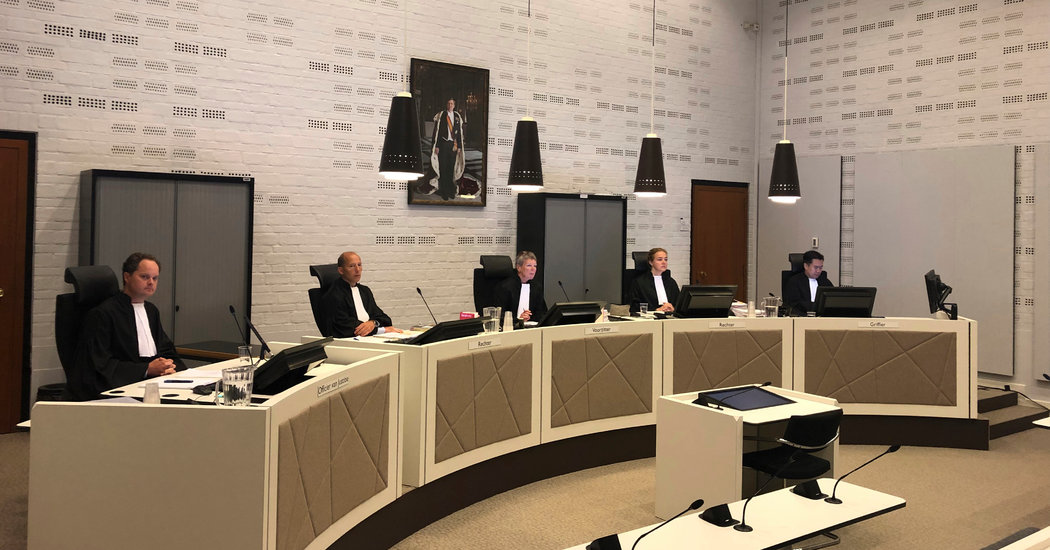
LONDON — A court in the Netherlands on Wednesday acquitted a doctor who had been accused of unlawful euthanasia for administering a lethal injection to a patient with dementia, a case that raised questions about the clarity of the country’s law in such circumstances.
The patient, 74, who has not been publicly identified, had asked in writing for doctors to end her life if she had to be admitted to a nursing home, and if she thought the time was right. But, when she entered the home, incapacitated, she appeared to have changed her mind, giving “mixed signals,” about her intentions, prosecutors said.
A female doctor at the home, now retired and also unidentified, decided to go through with the euthanasia, in close consultation with the family, in the spring of 2016.
A paper in the London-based Journal of Medical Ethics that reviewed the case said the doctor had put a sedative in the patient’s coffee and that the patient’s relatives had helped to hold her down as she struggled against the injection.
The review, published in 2018, said the case demonstrated the “myriad ethical concerns” raised by advance euthanasia directives.
Prosecutors said that the doctor did not act with due care, as required by the law. They said she should have cleared any doubt about the patient’s wish to die before going ahead with the procedure. Although prosecutors had pushed for a guilty verdict, they also made clear that they had brought the criminal case to try to resolve ambiguities of the euthanasia law, rather than to punish the doctor, whose motives they said were blameless.
The court cleared the doctor of any wrongdoing.
“The patient was heavily demented and deemed completely mentally incompetent,” the court said in an online statement. Medical records, heard during the proceedings, said the patient could not recognize her own reflection.
Taking into account the patient’s state, the court ruled that the doctor did not have to verify her wishes at the time of administering euthanasia.
Franz Zonneveld, a spokesman for the Public Prosecution Service of The Hague, said on Wednesday that the aim of the case had been to resolve the limits of the law.
“The court has given a clear ruling but on one point they have a very different view,” he said by phone, referring to the prosecutors’ belief that the doctor should have made greater efforts to confirm that the patient still wished to proceed with euthanasia.
“Even though she was suffering from dementia, you should check that as the physician, with the patient, and you should be 100 percent sure,” Mr. Zonneveld said.
The case was the first of its kind to prompt a criminal investigation since 2002, when the Netherlands became the first country to legalize euthanasia.
Questions are often raised about the parameters for those wishing to end their lives and about who should be allowed to take that step, and lessons from the Dutch system often reverberate internationally. The debate can be particularly complex when dementia patients are involved, and opinion is often divided almost on a case-by-case basis.
In 2017, after reports of an increase in euthanasia among dementia patients in the Netherlands, and of a growth in the practice of administering sedatives before lethal injections, a group of more than 200 doctors signed a letter urging against euthanasia based on advance directives from patients. The doctors argued that they were reluctant to end the life of people who could not confirm that they still wanted to die.
Dr. Scott Y.H. Kim, a psychiatrist and bioethicist at the National Institutes of Health in the United States, wrote in an email that, “When a human being is resisting — regardless of how ‘meaningless’ the action is in terms of intentions and understanding — and what she is resisting is an act to end her life,” then it could be “pretty difficult to take in.”
The Dutch law on euthanasia contains strict rules, known as due care criteria, that must be met in every case.
Among other conditions, the decision to request euthanasia has to be voluntary and carefully considered, and the patient must be facing a future of unbearable suffering with no reasonable alternative. The physician has to consult at least one other independent professional, and the procedure to end the patient’s life should be administered in a medically appropriate way.
The court ruling on Wednesday underlined the legal position that a doctor can carry out euthanasia on patients at least 16 years old who have made written requests to die but are no longer able to express that will, as long as the due care criteria have been fulfilled.
The Dutch Public Prosecution Service said in a statement that the patient’s advance directive in this case was clear but that a conversation should have continued about the patient’s wishes.
“As long as that conversation gave cause for doubt,” the prosecution service said, “the nursing home doctor should have refrained from euthanasia.”

